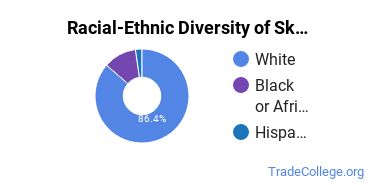Find Trade Colleges
Skin Institute Trade Programs
Located in Saint Louis, Missouri, Skin Institute is a private for-profit institution. Skin Institute is located in a safe and convenient suburb.
Featured schools near , edit
Where Is Skin Institute?

Contact details for Skin Institute are given below.
| Contact Details | |
|---|---|
| Address: | 25 Ronnie’S Plaza, Saint Louis, MO 63126 |
| Phone: | 314-843-2222 |
| Website: | www.skininstitute.edu |
Can I Afford Skin Institute?
Student Loan Debt
It's not uncommon for college students to take out loans to pay for school. In fact, almost 66% of students nationwide depend at least partially on loans. At Skin Institute, approximately 63% of students took out student loans averaging $4,738 a year. That adds up to $18,952 over four years for those students.
Skin Institute Undergraduate Student Diversity
Racial-Ethnic Diversity
The racial-ethnic breakdown of Skin Institute students is as follows.

| Race/Ethnicity | Number of Grads |
|---|---|
| Asian | 2 |
| Black or African American | 7 |
| Hispanic or Latino | 2 |
| White | 35 |
| International Students | 0 |
| Other Races/Ethnicities | 0 |
Skin Institute Trade School Concentrations
The table below shows the number of awards for each concentration.
| Major | Undergraduate Certificate | TOTAL |
|---|---|---|
| Aesthetician/Esthetician & Skin Care Specialist | 38 | 38 |
| TOTAL | 38 | 38 |
References
*The racial-ethnic minorities count is calculated by taking the total number of students and subtracting white students, international students, and students whose race/ethnicity was unknown. This number is then divided by the total number of students at the school to obtain the racial-ethnic minorities percentage.
More about our data sources and methodologies.
